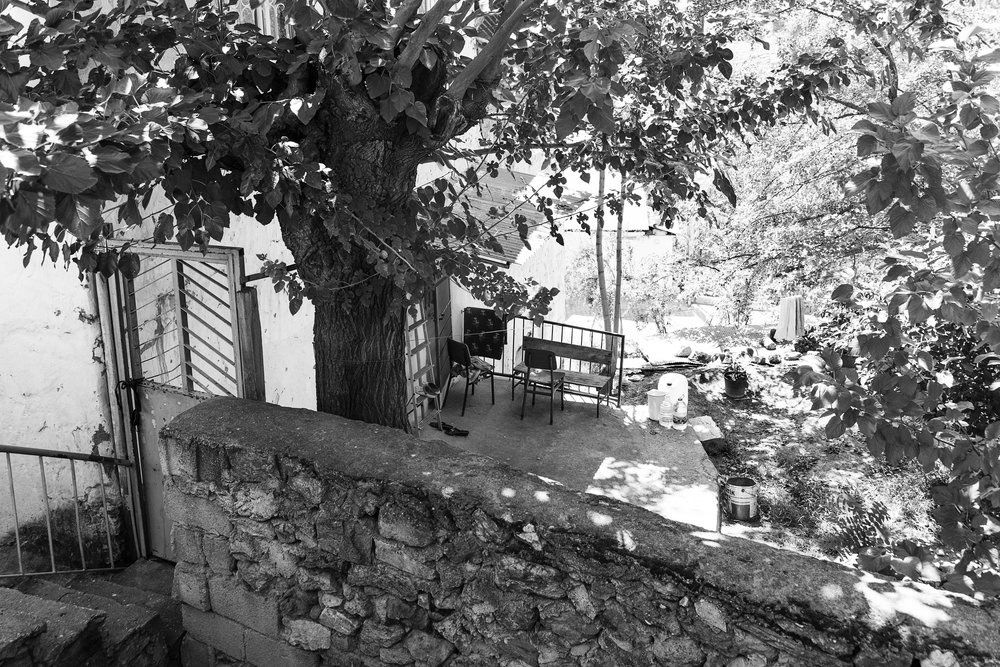
I watched it unfold on social media―months of deprivation, followed by a bloody siege and then a forced evacuation―from the comfortable distance of another country, surrounded by ocean, the one with the strongest, biggest military. No, they didn’t use it to help. Humanitarian is just a word. It means “oil money,” it means “in our national interest.” You probably know that more than anyone.
You will wonder why no one in your family talks about it, why no one talks.
They will have been shaped by it, like a forest after a blaze. They adapted.
They were children when it happened. They were told to move on, not to mourn, not to mention it. The consequences will be clear: that The Thing Not Talked About grows and grows until it is The Only Thing and if you can’t talk about The Only Thing, then there is nothing to say.
Your Old World Grandmother, in her East Hollywood craftsman, will be outwardly resilient. She will have been the engine that kept the whole family moving, from country to country, from year to year. She will have been ripped from her homeland as a baby and then again as a married mother of three, before resettling in a land that would never feel like home.
You will not really notice her for a long, long time though later you’ll remember her monosyllabic mantra, said whenever bad things happened to your family members, from the life-threatening to the minor: “No luck.” This will refer to not only our family, but our history, our whole civilization.
Another of Old World Grandmother’s responses to tragedies large and small: “What you can do? This is the life.” It is the matter-of-factness that will strike you, such perfect distillation of a life’s philosophy based on experience. She will speak these words on her way to the kitchen, the swish swish of her pantyhose under her housedress a fitting musical accompaniment to this most mundane little aria. What can you do? That’s life.
Your Between Worlds Mother will be driving you to a ballet lesson one day. You will be stuck in Los Angeles traffic or stopped at a stop light. Her eyes will lose focus as she stares into the middle distance out the windshield of her brown Carmaro. She will say: “I never had a chance.” You will be nine years old, so you won’t know what she means by this, exactly. Chance at life? At love? At happiness? At ballet lessons? But you will know it has something to do with her being a Displaced Person. You will know it is somehow related to you and your chance. You will not know how to feel about having a chance when she never got one.
Your Between Worlds Father will be like his father, mostly silent, a child in a man’s body. Only smoke will come out of his mouth―from the cigarettes he inhales while watching the TV stock ticker―or yelling, which he does when he is disappointed or scared or sad or angry or irritated or in mourning or bored.
You will be the New World, the clean slate, the past as it should have been, unruined.
You will have the feeling of being haunted by a past that never happened to you.
You will find some answers in literature and theater. You will read William Faulkner: “The past is never dead. It isn’t even past.” No one will not need to explain to you what that means. You will read about Chekhov’s three sisters longing for Moscow and a life that could have been. and think; “Yup.”
When, finally, you are grown, you will seek information, the stories, the truth and discover that they were children when it happened.
My father’s father survived. He was nine years old when his parents and four sisters were killed. He fled and survived in the company of nomads who dressed him as a girl and hid him from the soldiers.
My mother’s mother survived. She was just 40 days old when they “got out.” Her family resettled. Decades later, it happened again: a war; an evacuation; everything gone. Again.
My mother’s father survived. As a little boy he begged in the streets for a crust of bread to bring home to his mother and brothers.
My mother survived. Her family fled a war, not their own. It struck like lightning. It still burns.
What happens after survival?
What happens to a forest after a fire?
The still-alive branches sprout leaves during the next growing season. The trees born afterwards grow a thicker bark.
You will have sprung from a soil enriched by ash and arrive at a place beyond ruin, only to watch it happen again from the comfortable distance of another country.
When that happens do not be surprised if you feel a heat pulsing in the extensive root system, feel it rise through your trunk and into your branches.
When that happens, do not be surprised if, like the trees, you remember.
Lori Yeghiayan Friedman’s most recent work has appeared in Stanchion, Pithead Chapel, Hippocampus Magazine, Emerge Journal, Bending Genres, Autofocus Lit, Memoir Monthly and the Los Angeles Times. Her creative nonfiction piece ‘How to survive a genocide’ appeared in Exposition Review’s 2020 Act/Break issue and was nominated for a Pushcart Prize. She earned an MFA in Theatre from UC San Diego. Follow her on Twitter: @loriyeg
